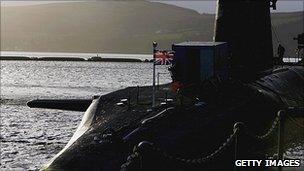Trident delay shows Lib Dem influence - Lord Ashdown
- Published

The Conservatives and Labour support a like-for-like replacement for Trident
Delaying the final decision on a like-for-like replacement of Trident is an example of Lib Dem influence on the coalition, ex-leader Lord Ashdown says.
He told the BBC the reported delay gave "an opportunity for us to have a more rational decision" about replacing the nuclear weapon system.
The Lib Dems oppose an identical replacement for a costly system they say was designed for the Cold War.
But their Conservative coalition partners are strongly in favour of one.
The Lib Dems secured an agreement with the Conservatives in their coalition agreement to carry out a value for money study aimed at exploring cheaper options to the estimated £20bn scheme currently in development.
'More rational decision'
Trident - which consists of four submarines which can deploy ballistic missiles carrying nuclear warheads - is an emotive issue for party members who have selected it for an emergency debate at their conference in Liverpool on Wednesday.
There was some confusion last week after it emerged that ministers might delay key decisions on renewal until after the next election in 2015.
Armed Forces Minister Nick Harvey said Britain remained committed to replacing its nuclear weapons but the timetable for financing the scheme could change as a result of a value for money review.
Speaking on BBC Radio 4's Today programme, Lord Ashdown was asked about the delay: "Does it give an opportunity for us to have a more rational decision about the Trident replacement? I think it does. It gives us space for that to be considered in a more rational fashion. I think that's a consequence of the Liberal Democrat influence in government and I think that's a good thing."
Previously the Lib Dems had been "excoriated by the press" for suggesting no decision was needed until about 2014, he said.
He added: "My view is that I can see no circumstances in the future where you may decide to replace Trident with a like-for-like replacement. That is not to say that Britain doesn't need an independent nuclear deterrent, it does.
"It's merely to say that in the present strategic circumstances there are better ways of fulfilling that need."
'Huge cost'
He said, bearing in mind the "huge cost that is attached to this system" he wanted to see a debate about whether an identical replacement was a "good idea".
On Sunday Lib Dem Home Office Minister Lynne Featherstone was questioned about the cost of renewing Trident by activists at the party conference.
She said: "I think you will have been somewhat encouraged then by the announcement that there might be no decision - the decision might be set back - on Trident.
"I think it is a measure that it is now on the table. It is not an absolute, it is no longer a certainty. So you know what can I say? That has to be Liberal Democrat influence."
In an interview with the Evening Standard last week Lib Dem leader, and deputy PM, Nick Clegg questioned "the idea that you need to replace Trident like-for-like so that you can flatten Moscow or Vladivostok at the touch of a button, for which it was designed at the height of the Cold War, at any minute, any day".
He also told BBC One's Andrew Marr Show that Trident should not be "exempt" from the nation's financial difficulties.
Prime Minister David Cameron has said Trident will be updated but said it was right that the government got "value for money".
Labour argue that delaying a decision could risk Britain's continuous "sea deterrence" and cost industry billions.